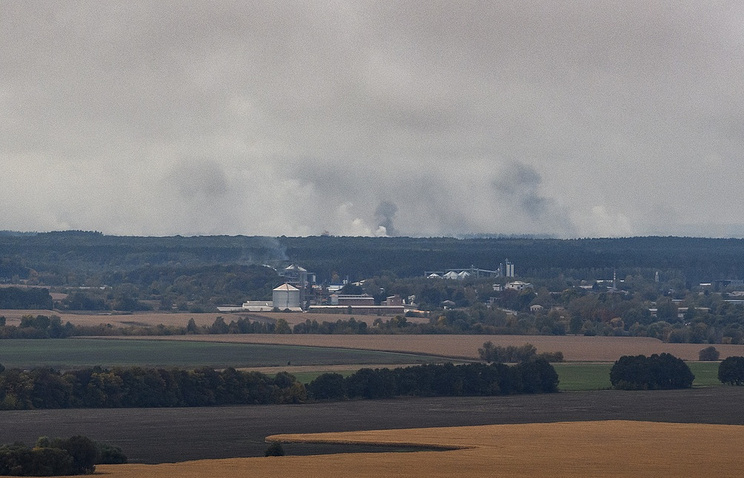angelburst29
The Living Force
September 28, 2018 - Once an outcast, Ukraine Patriarch to lead Church Split from Russia
Once an outcast, Ukrainian Patriarch ready to lead church split from Russia | Reuters
“I do not see any obstacles to getting the Tomos,” Filaret told Reuters, referring to the formal announcement that would grant the Ukrainian church “autocephaly”, or independence.
It would mark the end of a strange journey for Filaret, who was once a frontrunner to head the Russian Orthodox Church but switched tack to campaign for an independent Ukrainian church as the country won independence from Moscow.
I get the impression, that (Patriarch) Filaret "once a frontrunner to head the Russian Orthodox Church" was a rouge element, probably on the CIA's payroll - when Russia was the USSR - with the sole purpose of weakening and subverting the Russian Orthodox Church. I'm not aware of the details that caused Filaret's "defrocked and excommunicated" status, but it seems from his own testimony, he went to Ukraine to set up a church - separate from the Russian.
Going back in this thread to Dec.22, 2015, Post 2166 on page 145 - there was this entry:
Quote: The ministry noted that the situation near Rivne was a continuation of a series of similar seizures of churches of the Ukrainian Orthodox Church of the Moscow Patriarchate.
Russian Foreign Ministry: Evidence of Orthodox church seizure in Ukraine shocking
Russian Foreign Ministry: Evidence of Orthodox church seizure in Ukraine shocking
The Russian Foreign Ministry has called the seizure of an Orthodox church near Rivne by Ukrainian radical nationalists a flagrant violation of the right to freedom of conscience and religion.
Moscow is outraged by another unacceptable instance of an attack of the Ukrainian radical nationalists and extremist-minded splitters from the Ukrainian Orthodox Church with the connivance of the local police on the Cathedral of the Dormition of the Ukrainian Orthodox Church of the Moscow Patriarchate in Ptichye village near Rivne with the purpose of its seizure," the ministry said. "The evidence of this flagrant case provided by human rights activists and members of the public, including video footage, is shocking."
The ministry noted that developments near Rivne were "yet another flagrant violation of the fundamental right to freedom of conscience and religion in Ukraine." "This country’s international legal obligations in the field of human rights and fundamental provisions of the Ukrainian Constitution are again trampled under foot," it added.
The ministry noted that the situation near Rivne was a continuation of a series of similar seizures of churches of the Ukrainian Orthodox Church of the Moscow Patriarchate. According to it, ten cathedrals have been fully destroyed, 77 others severely damaged and at least three Orthodox priests have been killed. "Several churches have been seized because of inactivity and sometimes direct involvement of Ukraine’s law enforcement agencies," the Russian Foreign Ministry said. "Many priests fled to Russia trying to save themselves from threats by extremists." (End Quote).
Take note that the date on the report above is Dec.22, 2015. Two months later, on Feb. 28, 2016 - the Catholic Pope Francis made arrangements to meet Russian Orthodox Patriarch Kirill, on neutral ground in Havana. Other then a ceremonious "meet and greet" nothing more ever came out of the meeting? So, what was really behind Pope Francis's initiative? Apparently, what ever it was, Patriarch Kirill never bought into it and never invited Pope Francis to Russia.
Feb. 28, 2016 - The patriarch and the pope will meet on Friday in Cuba’s Havana for the first time since their churches split in the 11th century.
Latin Patriarch of Jerusalem Hopes Churches Can Turn to Single Calendar
As for Yulia Tymosshenko, if she ever replaced Poroshenko, I can only imagine "another major blood-bath like the Maiden" in Ukraine.
“As for our Ukrainian church, I want to say again firmly and clearly that our team and I myself support the decision to grant a tomos to the Ukrainian Orthodox Church with all our heart and all our capabilities in order to make our church independent of the Russian church, so that we can strengthen our sovereignty by receiving true independence of our Orthodox church,” Tymoshenko said at a press conference in Kyiv on Friday.



 Definitely, sabotage can't be ruled out but I get the odd feeling, this incident is a smokescreen to cover up something else? I wonder - if this massive explosion might be to get rid of biological experimental evidence? Recently, there were these reports and incriminating evidence might have been transferred to the ammunition warehouse in Ukraine for disposal?
Definitely, sabotage can't be ruled out but I get the odd feeling, this incident is a smokescreen to cover up something else? I wonder - if this massive explosion might be to get rid of biological experimental evidence? Recently, there were these reports and incriminating evidence might have been transferred to the ammunition warehouse in Ukraine for disposal?